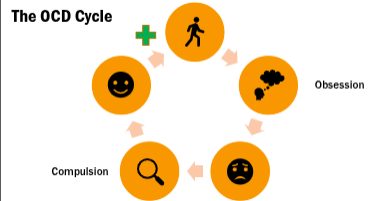Obsessive Compulsive Disorder
1/21
There's no tags or description
Looks like no tags are added yet.
Name | Mastery | Learn | Test | Matching | Spaced |
|---|
No study sessions yet.
22 Terms
What type of disorder is Obsessive-Compulsive Disorder (OCD)?
OCD is a type of anxiety disorder
What are the two main characteristics of OCD?
Obsessions and compulsions
Do both obsessions and compulsions need to be present for an OCD diagnosis?
No, only one is needed for diagnosis.
How does OCD impact daily life?
It causes significant functional impairment or distress.
What is a common cognitive pattern in OCD?
Excessive doubt and uncertainty.
Do people with OCD recognise that their behaviours are illogical?
Usually, yes, they are aware that their behavior is illogical.
What are obsessions in OCD?
Unwelcome intrusive thoughts, images, or urges that uncontrollably enter a person’s mind
What are compulsions in OCD?
Repetitive behaviours or acts that a person feels compelled to perform
What do compulsions do to a person?
They drive or force the person to act in a certain way
Is the exact cause of OCD fully understood?
No
What are some possible triggers for OCD?
Genetics, reduced serotonin, life events, and personality.
When is OCD most likely to develop?
In early adulthood.
What are some common obsessions in OCD?
Contamination, harming others, sexual thoughts, order/symmetry, violence/aggression and religion/blasphemy.
In OCD, why is the thought itself not the main problem?
The issue is not the thought itself, but the person's response to it.
What are some common compulsions in OCD?
Checking (locks, stoves, electricity), cleaning, ordering, neutralising thoughts, observing people, praying and avoidance.
How are compulsions typically related to OCD obsessions?
Compulsions are usually linked to the obsession and serve as a way to reduce anxiety.
The OCD cycle

What is the primary psychological treatment for OCD?
Cognitive Behavioural Therapy (CBT) with Exposure and Response Prevention (ERP)
What does Exposure and Response Prevention (ERP) involve?
Gradually exposing a person to their fears while preventing compulsive behaviours
What type of medication is commonly used to treat OCD?
Selective Serotonin Reuptake Inhibitors (SSRIs).
What is the most effective approach to treating OCD?
A combination of therapy (CBT + ERP) and pharmacological treatment (SSRIs).
Treatment
